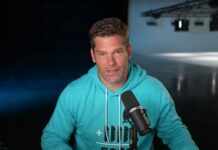Lecrae: For me, I try to demystify it as much as I can. I try to be as transparent as realistically possible to let people know that I’m in process.
Because people start holding you to standards that are unrealistic in terms of—I’m not a seminary professor—I think they start wanting to like zero in on every little thing you say or do and [are] looking at how you’re doing it. For me, I’m like, “Hey, this is a way.” I’m not saying, “It’s the way to do what I’m doing. It’s a way.”
I understand people are influenced. I get it. Andy’s song “None Of My Business” kind of rings to mind where it’s like, I’m sorry, I just can’t be responsible for everyone’s opinion out there about what they think I should be doing and how I should be doing it. I have a close circle of friends, I have my own church, I have my own kind of leadership that I’m connected to, and those are the people that I have to be most concerned with about—how I’m moving and navigating. But I can’t be worried about, you know, “madamj744” out on YouTube. I’d just lose my mind.
Andy: When you do anything in the public eye, you serve the public. And there’s an exchange—like my art or the thing that you enjoy—because, at the core of what we do, we are entertainers. We entertain you, and so you enjoy the things we create in your homes and in your cars. And with that comes a certain level of responsibility when people consume it.
Outside of being an entertainer, I try to live my life to a standard. I try to please God, my family, and my wife. And I think those things translate publicly, but the internet has given us access to people in a way to criticize them or praise them, and probably in ways that are unhealthy. But, like what Lecrae said, you can’t engage all of it, because it’s just literally impossible. So I just try to do the best I can with what I’ve got.
Lecrae said something one time that I thought was really helpful. He said,”When people don’t know the whole story, they just make one up.” And so I think that happens a lot. They don’t really understand it. So they just make up a whole story. “Oh, he got a Grammy because he’s in the Illuminati. Right?” Like, wait. What? So I have more compassion for people. I understand how they can be confused or judgmental, because I probably would have been them at one point. But I try to move with integrity and let the chips fall where they may, because it’s too overwhelming of a task to pay attention to everybody.
ChurchLeaders: We live a in culture that pressures artists to explain how and why to believe something. For example, if you aren’t vocal about a cultural topic, they pressure you into answering if you support this or that, and why you do or do not. How do you navigate fans pressuring you to affirm or speak out against things happening around us, and how do you handle the stress when someone approaches you regarding such issues?
Andy: From what I can see, I think people have a really tough time thinking for themselves. When I look at Jewish culture, where Yeshua was from, the way He taught His disciples was primarily by answering their questions with questions. Because when you ask questions, it causes the person engaging to think, process, feel—coming to their own conclusions.
We kind of live in like an answer driven culture, where the pastor is the guy who has all the answers. It’s heavily focused on a single person being the director—the leader of all things. I think that can be unhealthy, because it can remove the thinking and the processing out of the individual. And what I want to do with what I have is not just help people get good answers—I want to help people ask better questions.
I want to give better questions, so people can think for themselves. So I don’t necessarily feel even compelled to always have the answers.
For example, yesterday, I did a meet-and-greet, and some kid was like, “What do you do when you feel down?” And I just was like, “Hey, I talk to my friends.” And then he goes, “But you talk to God too, right?” He wanted me to give him a Christian answer, and I said, “Yeah, but sometimes I don’t feel like talking to God.” And some people in the room were like, “Thank you,” because finally someone was honest. Sometimes, I don’t feel like talking to God. I talk to my friends, who are wise, and I feel like God can speak through them—through community, the church.
With public attention comes public criticism. Once I stopped saying I have the answers, they’ve kind of stopped looking to me for that.











